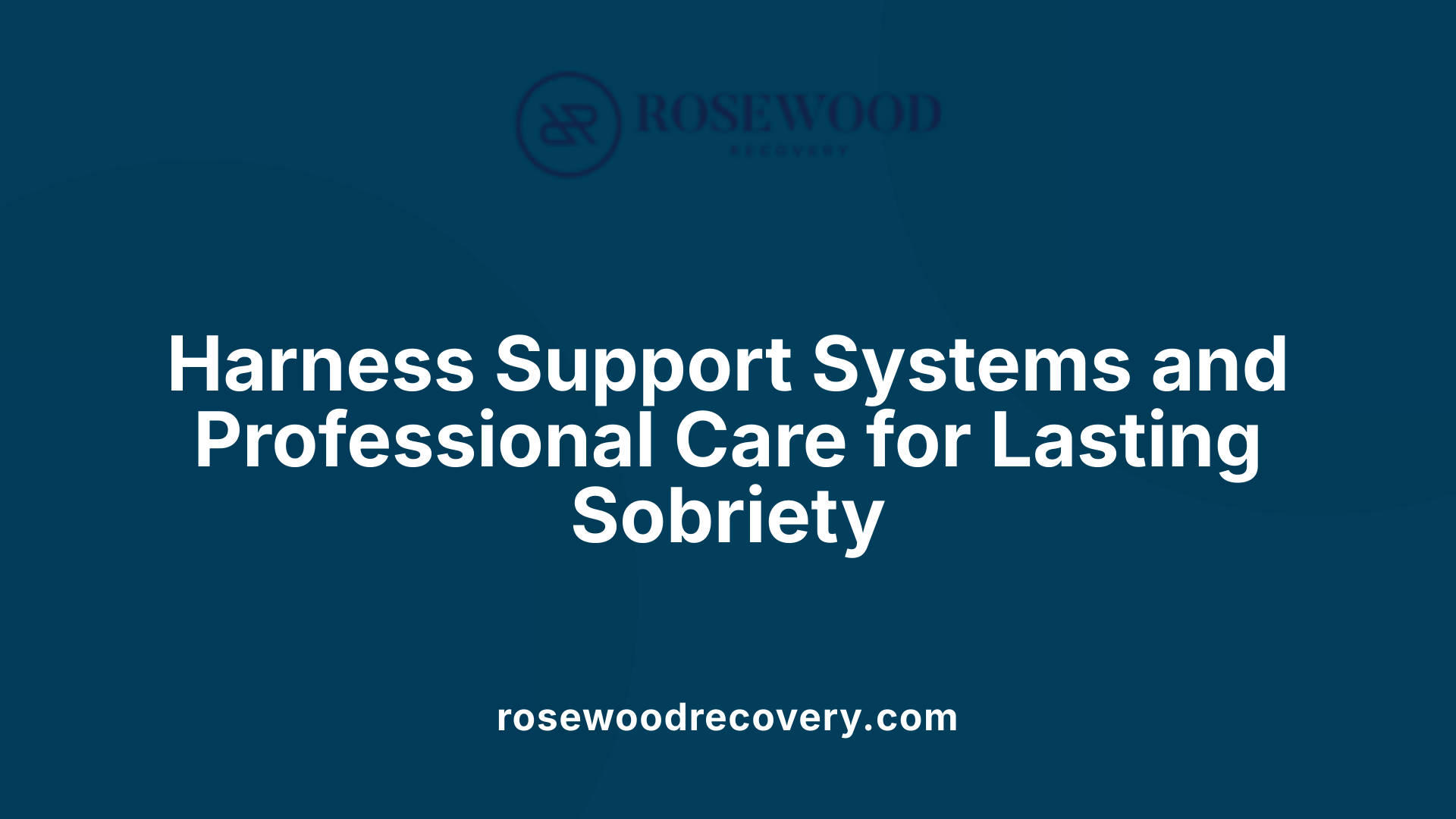The Foundation of Recovery: Why Structure Matters
In the challenging journey of early recovery from addiction, individuals often confront the chaos that fueled their substance use. Establishing a structured routine emerges as a vital strategy, providing stability, predictability, and purpose. This article explores how routine supports recovery by fostering healthy habits, reducing relapse risks, and promoting emotional well-being, while also highlighting the integral role of comprehensive treatment services in facilitating these structured approaches.
Understanding Comprehensive Treatment Services in Addiction and Mental Health Recovery

What are comprehensive treatment services for substance abuse and mental health issues?
Comprehensive treatment services are integrated care programs that address the complex needs of individuals struggling with both substance abuse and mental health disorders. These services combine medical and therapeutic interventions, including detoxification, individual and group counseling, behavioral therapies, medication-assisted treatment, and case management. This holistic approach ensures that physical, psychological, and social aspects of recovery are addressed simultaneously.
Components and integration in care
A hallmark of comprehensive treatment is its integration of substance abuse and mental health care. Instead of treating each condition separately, services are coordinated within one framework, often led by multidisciplinary teams of professionals such as doctors, therapists, social workers, and peer support specialists. This integration empowers clients to receive personalized treatment plans that may include outpatient or inpatient care, crisis support, and community resources, promoting sustained recovery.
Role of multidisciplinary teams and individualized care
Multidisciplinary teams play a pivotal role by collaborating to develop individualized care plans that reflect each client’s unique challenges, strengths, and goals. They deliver evidence-based therapies and support services tailored to empower clients on their recovery journey. By blending expertise from various fields, these teams address medical issues, psychological needs, social support, and skill-building, providing a continuum of care that adapts as recovery progresses.
Together, comprehensive treatment services offer a structured, supportive, and adaptable environment that fosters healing, resilience, and lasting sobriety for individuals facing the dual challenges of addiction and mental health disorders.
How Structure Provides Stability and Predictability in Early Recovery

What Role Does Structure Play in Reducing Uncertainty and Chaos?
Structure acts as a stabilizing force during early recovery by reducing uncertainty and preventing the chaos often experienced by individuals overcoming addiction. A consistent daily routine minimizes idle time, which helps curb restlessness and boredom that can trigger relapse. By filling the day with meaningful activities—such as therapy sessions, work, chores, and hobbies—structure limits the mental clutter and stress that typically fuel cravings. This predictability helps create a calmer, more focused mindset, reducing the likelihood of impulsive or harmful behavior.
How Does Structure Create a Sense of Control and Normalcy?
Establishing a structured schedule fosters a sense of control by providing clear expectations and a predictable rhythm to each day. For many in recovery, coping with chaos or uncertainty from past behaviors feels overwhelming. A well-balanced routine consisting of morning rituals, nutritious meals, physical activity, and social support reconnects individuals with healthy daily practices. This reinstatement of normalcy builds self-discipline and accountability, helping individuals rebuild trust in themselves and others while promoting sustainable habits that reinforce sobriety.
What Is the Impact of Structure on Emotional and Mental Health?
Structured routines have a positive impact on emotional and mental well-being by creating small victories that boost self-esteem and emotional resilience. Engaging in regular activities like mindfulness, support group meetings, and creative hobbies provides constructive outlets for stress and emotional processing. This helps manage common triggers such as anxiety, loneliness, and fatigue, which can otherwise undermine recovery. Additionally, routines support better sleep hygiene and physical health, contributing to overall stability and reducing relapse risks.
In summary, structured routines provide the foundation for stability and predictability that are vital for early recovery success. They reduce chaos and uncertainty, promote a sense of control and normalcy, and support emotional and mental health throughout the recovery journey.
Routine as a Tool to Replace Substance Use with Healthy Habits

How Does Routine Help in Forming New Habits?
Routine acts as a foundation that supports habit development by providing structure and predictability during addiction recovery. Establishing daily activities and rituals helps individuals systematically replace substance use with healthier behaviors. This structure minimizes idle time and distractions, keeping individuals focused on positive actions which gradually become automatic practices.
What Is the Typical Timeline for Habit Formation?
Research suggests that it takes approximately 66 days to form a new habit, although this timeline can vary by person and behavior. Consistent engagement in a routine supports this process by encouraging repetition, which strengthens neural pathways associated with the new habit. Early recovery phases especially benefit from routine to maintain progress and avoid relapse triggers.
What Are Some Examples of Healthy Practices to Adopt?
Typical healthy habits integrated into recovery routines include:
- Physical activity: Exercise improves mood and overall health.
- Nutritious eating: Balanced meals support physical and mental well-being.
- Sleep hygiene: Regular sleep schedules aid emotional stability and cognitive function.
- Therapy and support group participation: These activities support emotional health and accountability.
- Hobbies and leisure activities: Engaging interests help replace destructive behavior patterns.
By embedding these practices into daily routines, individuals rebuild healthier lifestyles that promote sustained sobriety and mental wellness.
Reducing Relapse Risks through Structured Activities and Time Management

How structured schedules help manage idle time and triggers
Structured daily routines play a crucial role in reducing relapse risks by managing idle time and minimizing exposure to triggers. Recovery individuals often face restlessness and boredom during unoccupied periods, which can lead to cravings or negative thoughts. Incorporating purposeful activities such as therapy sessions, work, chores, hobbies, and social interactions effectively fills these gaps, providing meaningful engagement that prevents relapse triggers from taking hold.
Role of therapy, hobbies, and social support
Therapeutic activities like individual therapy, group therapy, and support group meetings offer emotional and psychological support critical for sustained recovery. Alongside therapy, hobbies such as art, music, yoga, and outdoor activities serve as positive outlets that replace destructive habits with fulfilling pursuits. Social support from family, peers, and community groups further strengthens resilience, offering encouragement during challenges and reinforcing the structure needed for recovery stability.
Importance of accountability and self-discipline
Accountability in recovery is fostered through consistent routines that cultivate self-discipline and build trust with oneself and others. Morning rituals, therapy attendance, nutritious meals, and scheduled work or volunteer activities promote discipline and a sense of accomplishment. Starting small, maintaining flexibility, using tools like reminders, and celebrating progress help sustain these routines long term, ensuring that individuals remain engaged and committed to their recovery journey.
Emotional Resilience and Mental Health Benefits of a Well-Designed Routine
Building Self-Esteem and a Sense of Accomplishment
Constructive routines provide frequent opportunities for small victories, which play a vital role in boosting self-esteem during recovery. As individuals consistently complete daily tasks—whether therapy sessions, chores, or hobbies—they experience a sense of accomplishment that reinforces positive self-worth. This process is crucial in addressing some underlying emotional challenges related to addiction, creating a foundation for sustained recovery.
Supporting Emotional Balance and Reducing Stress
Structured daily schedules foster emotional stability by reducing feelings of uncertainty and mitigating stress. By filling idle times with purposeful activities, routines help manage triggers like anxiety, restlessness, and cravings. This consistent framework aids in balancing emotions and coping with the mental and physical strains of withdrawal and recovery, promoting resilience against relapse.
Incorporating Mindfulness, Relaxation, and Reflection
Incorporating mindfulness practices and relaxation activities such as gratitude journaling, meditation, or gentle yoga into a daily routine contributes significantly to emotional health. Ending the day with these reflective practices supports better sleep hygiene and emotional processing, helping individuals maintain calmness and psychological well-being. These elements complement the physical and social activities that round out a healthy, recovery-focused lifestyle.
Key Components of Effective Recovery Routines
Physical activity, sleep hygiene, nutrition
Engaging in regular physical exercise plays a crucial role in recovery by improving physical health, reducing stress, and boosting mood. Alongside exercise, maintaining good sleep hygiene helps regulate the body's internal clock, leading to better sleep quality and improved mental health. Balanced nutrition supports bodily functions and energy levels essential for sustaining recovery efforts.
Therapy and support meetings
Incorporating therapeutic activities such as individual therapy, group therapy, and participation in support meetings like Alcoholics Anonymous (AA) or alumni groups offers emotional and psychological support. These sessions create a structured space for sharing challenges, learning coping strategies, and fostering accountability, which are vital for sustained sobriety.
Leisure, hobbies, social and spiritual activities
Leisure activities and hobbies provide meaningful engagement that replaces destructive patterns with fulfilling pursuits, bolstering self-esteem and mental well-being. Social connections offer support and reduce feelings of isolation. Additionally, spiritual practices, including meditation and prayer, contribute to emotional resilience and inner peace, supporting the recovery journey.
Practical Strategies for Maintaining and Adapting Recovery Routines
Starting small and building gradually
Beginning with manageable routine changes helps prevent overwhelm and encourages consistency. Small steps, like adding a daily morning ritual or a short walk, create a foundation on which to build further healthy habits over time. This gradual progression allows habits to solidify naturally, supporting long-term recovery.
Using tools and reminders
Utilizing planners, apps, or alarms can keep individuals accountable and prompt routine adherence. These tools help schedule key activities such as therapy sessions, support group meetings, meals, and exercise, ensuring consistency even during challenging days.
Flexibility and regular reevaluation
While consistency is important, routines should remain flexible and open to adjustment. Regularly assessing and modifying the schedule according to changing needs allows balance and sustainability, preventing burnout or feelings of restriction during recovery.
Seeking support and celebrating progress
Engagement with family, peers, and professionals provides encouragement and accountability. Celebrating small achievements, like completing a week of consistent exercise or attending therapy sessions, reinforces motivation and fosters positive momentum essential for enduring recovery success.
The Role of Support Systems and Professional Treatment in Sustaining Routine and Sobriety

Why are family, peers, and professionals important in maintaining routines during recovery?
Support from family, friends, peers, and professionals plays a vital role in maintaining and adapting recovery routines. These positive supports provide encouragement, accountability, and emotional stability during periods of unoccupied time when relapse risks are higher. They help individuals in early recovery navigate challenges associated with unused time and reinforce commitment to structured schedules, reducing feelings of isolation and vulnerability.
How can routines be integrated with comprehensive treatment services?
Integrating daily routines with professional treatment services enhances their effectiveness. Recovery routines often include attending therapy sessions—both individual and group—participation in support groups like AA, and engaging in alumni networks. These therapeutic activities not only occupy time constructively but also support emotional and psychological health. By aligning routines with treatment components such as counseling, medical care, and skill-building workshops, individuals form a holistic recovery plan that addresses both behavioral habits and underlying addiction issues.
How do support networks help sustain long-term recovery success?
Support networks foster ongoing stability and motivation needed for long-term recovery. They assist in regularly reevaluating and adjusting routines to keep them attainable and flexible, a necessity for sustaining recovery over time. Family and peers provide emotional reinforcement and create social accountability, while professionals offer expert guidance and monitor progress. Together, these networks help prevent relapse by filling idle time with meaningful, fulfilling activities and encouraging continued engagement in healthy habits and recovery-focused behaviors.
Building Lasting Recovery Through Structure and Support
Structure and routine are not merely helpful in early recovery; they are essential. By providing consistency, reducing uncertainty, and replacing destructive behaviors with positive habits, they set the foundation for lasting sobriety. When combined with comprehensive treatment services and robust support networks, structured routines promote emotional stability, mental health, and resilience against relapse. Individuals in recovery can thus reclaim control over their lives and build a hopeful, sustainable future grounded in healthy, purposeful living.
References
- Why Structure and Routine Are Important in Recovery
- Habits and Routines of Adults in Early Recovery From ...
- The Role of Structured Daily Schedules in Sobriety ...
- The Importance of Structure and Routine in Recovery
- The Importance of a Structured Daily Schedule in Rehab
- Why Routine Matters in Addiction Recovery
- The Importance of Structure and Routine in Recovery
- The Importance of Sticking to a Routine
- FindTreatment.gov: Home
- Services and Resources - Missouri Department of Mental Health




